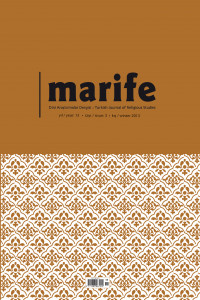Abstract
The Claim of Male Domination in Terms of Arab Language in the Qur'an This study covers one of the unjust critiques regarding the issue of women in Islam: “Since the language of revelation is masculine therefore the woman as a subject has a secondary importance in it.” This study explains this claim by speculating the domination of male over female in the Arabic language and the Qur'an. Also, I used applicable examples that show the generous rhetoric of Qur’an, that remove any suspicions and make everything clear. However, one aspect of the case is a matter related to the technical aspects of the Arabic language. According to the general approach to the Qur'an, it is not considering/addressing people in addition to the gender but rather to all humanity. Provisions are brought to men and women at the same level. Beyond that Islam does not see woman as a second-class hu- man being but rather to act as an educator of future generations. We have examined gender in the characteristic structure of the Arabic language and its reflections on the Quranic text. In this frame, we looked at the shared (mushtarak) and feminine phases of the Qur'an and have investigated the intended style of the Qur’an
Abstract
Bu çalışma, İslam’da kadının konumu hakkında yapılan (haksız) eleştirilerden birisi olan, vahiy dilinin eril dil olduğu ve bu haliyle de kadını bir tür olarak ikincil konuma getirdiği iddiasını konu edinmektedir. Oysa durum bir yönüyle Arap dilinin teknik yapısıyla alakalı bir konudur. Ayrıca Kur’ân-ı Kerîm’in insanı genel format çerçevesinde cinsiyeti ile değil insanlığına göre değerlendiriyor olması, getirmiş olduğu hükümlerle erkek ve kadını aynı seviyeye koyması bu hatalı yorumu kökten reddetmektedir. Bunun ötesinde İslam kadına, iddia edildiği gibi ikinci sınıf bir varlık değil, gelecek nesillerin mürebbiyesi olma hasebiyle özel bir değer atfetmektedir. Çalışmada bu bağlamda Arap Dilinin karakteristik yapısında cinsiyet konusu ve bunun Kur’ân’a yansıması ele alınmıştır. Zira Arap Dilinde, biri (kadınlara ait ferdî veya içtimaî hususî durumun karşılığı) sadece müennes, diğeri de hem müennes ve müzekker birlikte olmak üzere iki türlü hitap tarzı vardır. Bu bağlamda olmak üzere Kur’ân’ın (müşterek ve müennesliğine ait) hitap tarzları ile Kur’ân üslûbunda hedeflenen özel mesaj da çalışmada ayrıca değerlendirilmiştir
Keywords
Details
| Primary Language | Turkish |
|---|---|
| Subjects | Religion, Society and Culture Studies |
| Other ID | JA24SZ55SU |
| Journal Section | Research Article |
| Authors | |
| Publication Date | December 30, 2013 |
| Published in Issue | Year 2013Volume: 13 Issue: 3 |
This work is licensed under a Creative Commons Attribution-NonCommercial 4.0 International License.


